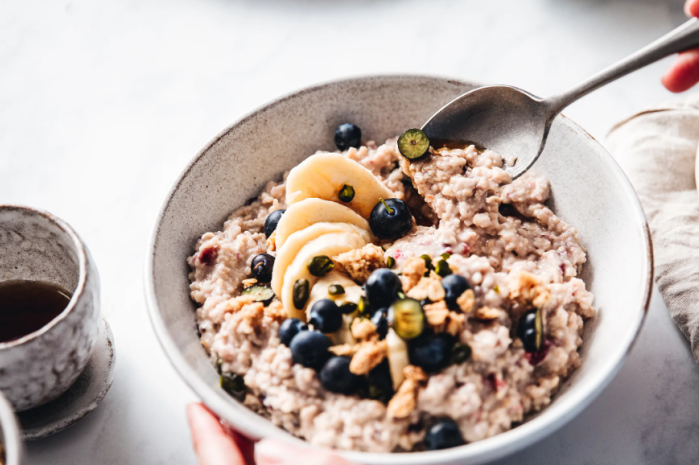Breakfast is often touted as the most important meal of the day, and for individuals managing heart disease, this sentiment holds even more significance.
A heart-healthy breakfast can set the tone for the entire day, providing essential nutrients, regulating blood sugar levels, and supporting overall cardiovascular health.
In this comprehensive guide, we’ll explore the importance of breakfast for people with heart disease and offer practical tips and nutritious breakfast options tailored to promote heart health and well-being.
The Importance of Breakfast for Heart Health
Before delving into specific breakfast recommendations, it’s crucial to understand why breakfast is essential for individuals with heart disease:
1. Regulation of Blood Sugar Levels:
Breakfast helps kickstart metabolism and stabilize blood sugar levels after an overnight fast. For individuals with heart disease, maintaining stable blood sugar is vital for preventing spikes and crashes that can strain the cardiovascular system.
2. Nutrient Intake:
Breakfast provides an opportunity to nourish the body with essential nutrients, including fiber, vitamins, minerals, and antioxidants. These nutrients play a critical role in supporting heart health, reducing inflammation, and lowering cholesterol levels.
3. Energy Boost:
A nutritious breakfast provides the energy needed to fuel physical activity and mental focus throughout the day. For individuals with heart disease, maintaining energy levels is essential for engaging in regular exercise, managing stress, and performing daily tasks.
4. Satiety and Weight Management:
Eating a balanced breakfast can help control appetite and prevent overeating later in the day. For individuals with heart disease who may be managing their weight or cholesterol levels, starting the day with a satisfying breakfast can support long-term health goals.
Principles of a Heart-Healthy Breakfast
When planning a breakfast for someone with heart disease, it’s essential to adhere to principles that promote cardiovascular health:
1. Focus on Whole Foods:
Emphasize whole, minimally processed foods such as fruits, vegetables, whole grains, lean proteins, nuts, seeds, and healthy fats. These foods are rich in nutrients and antioxidants that support heart health and reduce the risk of chronic diseases.
2. Limit Added Sugars and Sodium:
Minimize the consumption of added sugars, refined carbohydrates, and high-sodium foods, as these can contribute to inflammation, high blood pressure, and weight gain. Choose naturally sweetened options and opt for low-sodium alternatives when possible.
3. Incorporate Fiber-Rich Foods:
Include fiber-rich foods such as fruits, vegetables, whole grains, legumes, and nuts to support digestive health, lower cholesterol levels, and promote satiety. Fiber helps regulate blood sugar levels and keeps you feeling full and satisfied until your next meal.
4. Choose Healthy Fats:
Prioritize sources of healthy fats such as avocado, olive oil, nuts, seeds, and fatty fish, which provide omega-3 fatty acids and monounsaturated fats that support heart health. Limit saturated and trans fats found in processed and fried foods.
5. Balance Macronutrients:
Aim for a balanced breakfast that includes a combination of carbohydrates, proteins, and fats to provide sustained energy and promote satiety. Include a variety of nutrient-dense foods to ensure you’re getting a broad spectrum of essential nutrients.
Nutritious Breakfast Options for Heart Disease
Now, let’s explore some heart-healthy breakfast ideas that are delicious, satisfying, and supportive of cardiovascular health:
1. Oatmeal with Fresh Berries and Nuts:
Start your day with a bowl of oatmeal topped with fresh berries (such as strawberries, blueberries, or raspberries) and a sprinkle of chopped nuts (such as almonds, walnuts, or pecans).
Oatmeal is rich in soluble fiber, which helps lower cholesterol levels, while berries provide antioxidants and nuts offer healthy fats and protein.
2. Greek Yogurt Parfait:
Layer Greek yogurt with sliced bananas, diced mangoes, and a drizzle of honey or maple syrup for a creamy and satisfying breakfast parfait. Greek yogurt is high in protein and probiotics, which support digestive health, while fruits add sweetness and fiber.
3. Whole Grain Toast with Smashed Avocado and Tomatoes:
Top whole grain toast with mashed avocado, sliced tomatoes, and a sprinkle of sea salt and black pepper for a heart-healthy twist on classic avocado toast. Avocado provides monounsaturated fats, while tomatoes add antioxidants and flavor.
4. Vegetable Omelette with Spinach and Feta:
Whip up a vegetable omelette using eggs, spinach, bell peppers, onions, and feta cheese for a protein-packed and nutrient-rich breakfast. Eggs are a good source of protein and essential nutrients, while vegetables add fiber, vitamins, and minerals.
5. Smoothie with Leafy Greens and Berries:
Blend together leafy greens (such as spinach or kale), frozen berries, Greek yogurt, and a scoop of protein powder for a refreshing and nutritious breakfast smoothie. Leafy greens are rich in vitamins and antioxidants, while berries provide fiber and sweetness.
6. Whole Grain Pancakes with Nut Butter and Banana Slices:
Enjoy a stack of whole grain pancakes topped with nut butter (such as almond or peanut butter) and sliced bananas for a hearty and satisfying breakfast. Whole grain pancakes offer fiber and complex carbohydrates, while nut butter adds protein and healthy fats.
7. Chia Seed Pudding with Almond Milk and Fruit:
Prepare chia seed pudding by soaking chia seeds in almond milk overnight and topping with fresh fruit (such as mango, kiwi, or pineapple) and a sprinkle of cinnamon or nutmeg. Chia seeds are rich in omega-3 fatty acids, fiber, and antioxidants, making them an excellent choice for heart health.
Tips for a Heart-Healthy Breakfast Routine
In addition to incorporating nutritious foods into your breakfast, consider the following tips for establishing a heart-healthy breakfast routine:
1. Plan Ahead:
Take time to plan your breakfasts for the week ahead and stock up on ingredients that support heart health. Preparing breakfasts in advance can save time and ensure you have healthy options readily available.
2. Practice Portion Control:
Be mindful of portion sizes and avoid overeating, even if the foods are nutritious. Pay attention to hunger and fullness cues and stop eating when you feel satisfied.
3. Hydrate:
Start your day with a glass of water to stay hydrated and support optimal heart function. Consider incorporating herbal tea or infused water for added variety and hydration.
4. Mindful Eating:
Take the time to savor and enjoy your breakfast, paying attention to the flavors, textures, and sensations of each bite. Eating mindfully can enhance satisfaction and prevent overeating.
5. Be Flexible:
Don’t be afraid to mix up your breakfast routine and try new foods and recipes. Variety is key to maintaining interest and ensuring you get a broad range of nutrients.
Conclusion
In conclusion, breakfast plays a crucial role in supporting heart health and overall well-being, especially for individuals managing heart disease. By focusing on whole, nutrient-rich foods, minimizing added sugars and sodium, incorporating fiber-rich foods, choosing healthy fats, and balancing macronutrients, individuals can enjoy delicious and satisfying breakfasts that promote cardiovascular health.


























